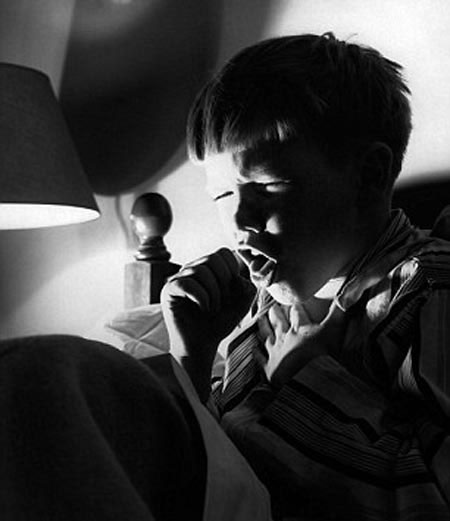Why does the disease often become heavy at night?
Most people with colds, asthma, headaches, etc. often experience symptoms that worsen at night. Experts have identified the culprit causing this situation.
Asthma

Nighttime cough is a common phenomenon in people with asthma, making them unable to sleep well. Asthma patients also tend to experience more severe symptoms at night, including wheezing.
Experts say this may be related to the circadian rhythm of the body (for a 24-hour cycle). Levels of hormones, such as h ormone, cause cortisol stress , which changes at night, affecting the airways. Specifically, after midnight, the rate of respiration drops to the lowest level, leading to the transfer of oxygen into the bloodstream and the elimination of carbon dioxide from the body becomes less effective.
In addition, the bedroom is also flooded with common hormones for asthma, including house pads in bedding, mats, cotton toys, carpets and curtains. Ventilation in the bedroom is often poor and mold spores will proliferate in warm and humid environments.
Horizontal posture can also make the condition worse. For example, coughing when lying down may be due to pressure on the diaphragm (the muscle that divides the chest area to the abdomen), especially if someone is obese, stomach reflux or has a runny nose, causing mucus from the nose flows down the back of the throat.
Cold, nerve shingles

Many people say that the symptoms of a viral infection such as a cold or nerve shingles will get worse at night.
In the case of shingles, Professor John Oxford of the virology department, Queen Mary School, University of London (UK) said that getting worse at night may be due to an increase in the concentration of signal transducers. Neurological and hormones related to feeling pain. Next to it, people can often be more anxious at night, aggravating the pain.
For colds, Mr. Oxford has a very simple explanation: "The lining of the respiratory tract constantly brings small particles and fluid out of the lungs, into the throat. This process becomes less effective when you horizontal, clogging and coughing ".
Headache

One of the most annoying forms of headaches - cluster headaches usually occurs at about 2 am, while its "brother" disease - migraine often causes people to wake up. At night.
According to Dr. Andy Dowson, head of the King's University Hospital Headache Clinic, UK headaches can be related to our sleep cycle , when people move from Deep sleep, rapid eye movement (REM sleep phase) comes almost awake.
The brainstem area, also known as the brain stem, is believed to be responsible for regulating the sleep cycle and also affects migraine."In the tests we discovered, the first stage of migraine headaches started in the hypothalamus , " Dowson said.
Experts have pointed out some common hormones of headaches, including skipping meals, certain foods or glare or flickering. Some other factors, such as weather changes, can lead to a headache, but cannot be prevented.
- 4 frightening consequences of eating at night without your knowledge
- From tomorrow night, the North rains heavily
- Lao Cai: Big pipes suddenly appeared in the night
- Storm accompanied by heavy rain raging across Italy
- Detection of fog containing heavy metals
- Day and night how much temperature difference affects health?
- 3 times to drink water helps prevent heart disease
- From the night of August 2 to the end of August 6, the North entered a heavy thunderstorm
- See the fantasy night under the talented hands of Canadian photographer
- See 21 photos of the breathtaking night sky
- Bac Bo rains heavily at night and in the morning, Hanoi is likely to flood
- 10 people died, 80 were injured in storms
 Green tea cleans teeth better than mouthwash?
Green tea cleans teeth better than mouthwash? Death kiss: This is why you should not let anyone kiss your baby's lips
Death kiss: This is why you should not let anyone kiss your baby's lips What is salmonellosis?
What is salmonellosis? Caution should be exercised when using aloe vera through eating and drinking
Caution should be exercised when using aloe vera through eating and drinking